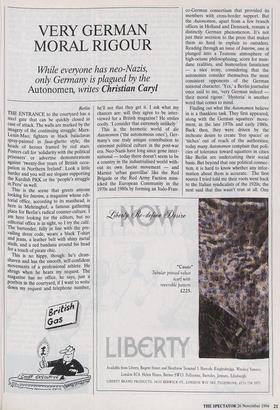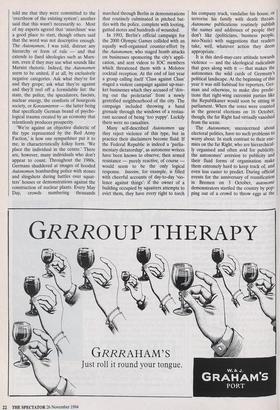VERY GERMAN MORAL RIGOUR
While everyone has neo-Nazis, only Germany is plagued by the
Autonomen, writes Christian Cal-34 Berlin THE ENTRANCE to the courtyard has a steel gate that can be quickly closed in case of attack. The walls are marked by the imagery of the continuing struggle: Marx- Lenin-Mao; fighters in black balaclavas spray-painted in faux-ghetto style; the heads of heroes framed by red stars. Posters call for solidarity with the political prisoners' or advertise demonstrations against 'twenty-five years of British occu- pation in Northern Ireland'. Look a little harder and you will see slogans supporting the Kurdish PICK or the 'people's struggle in Peru' as well.
This is the scene that greets anyone looking for Interim, a magazine whose edi- torial office, according to its masthead, is here in Mehringhof, a famous gathering place for Berlin's radical counter-culture. I am here looking for the editors, but no editorial office is in sight, so I try the café. The bartender, fully in line with the pre- vailing dress code, wears a black T-shirt and jeans, a leather belt with shiny metal studs, and a red bandana around his head for a touch of pirate chic.
This is no hippy, though: he's clean- shaven and has the smooth, self-confident movements of a professional athlete. He shrugs when he hears my request. The magazine has no office, he says, just a postbox in the courtyard; if I want to write down my request and telephone number, he'll see that they get it. I ask what my chances are: will they agree to be inter- viewed for a British magazine? He smiles coolly. 'I consider that extremely unlikely.'
This is the hermetic world of die Autonomen (`the autonomous ones'), Ger- many's one truly unique contribution to extremist political culture in the post-war era. Neo-Nazis have long since gone inter- national — today there doesn't seem to be a country in the industrialised world with- out its own fascist movement — and Marxist 'urban guerrillas' like the Red Brigade or the Red Army Faction mim- icked the European Community in the 1970s and 1980s by forming an Italo-Fran- co-German consortium that provided its members with cross-border support. But the Autonomen, apart from a few branch offices in Holland and Denmark, remain a distinctly German phenomenon. It's not just their aversion to the press that makes them so hard to explain to outsiders. Reading through an issue of Interim, one is plunged into a Teutonic atmosphere of high-octane philosophising, scorn for mun- dane realities, and humourless fanaticism — a nice irony, considering that the autonomes consider themselves the most consistent opponents of the German national character. 'Yes,' a Berlin journalist once said to me, 'very German indeed — their moral rigour.' Hysteria' is another word that comes to mind.
Finding out what the Autonomen believe in is a thankless task. They first appeared, along with the German squatters' move- ment, in the late 1970s and early 1980s. Back then, they were driven by the inchoate desire to create 'free spaces' or `niches' out of reach of the authorities; today many Autonomen complain that poli- cies of tolerance toward squatters in cities like Berlin are undercutting their social basis. But beyond that one political connec- tion, it is hard to know whether any infor- mation about them is accurate. The first source I tried told me their roots went back to the Italian syndicalists of the 1920s; the next said that this wasn't true at all. One told me that they were committed to the `overthrow of the existing system'; another said that this wasn't necessarily so. Most of my experts agreed that 'anarchism' was a good place to start, though others said that the word was not descriptive enough. The Autonomen, I was told, distrust any hierarchy or form of rule — and that extends to fixed ideologies such as Marx- ism, even if they may use what sounds like Marxist rhetoric. Indeed, the Autonomen seem to be united, if at all, by exclusively negative categories. Ask what they're for and they grope; ask what they're against and they'll reel off a formidable list: the state, the police, the speculators, fascists, nuclear energy, the comforts of bourgeois society, or Konsumterror — the latter being that specifically German brand of psycho- logical trauma created by an economy that relentlessly produces prosperity.
`We're against an objective dialectic of the type represented by the Red Army Faction,' is how one sympathiser put it to me, in characteristically folksy form. 'We place the individual in the centre.' There are, however, many individuals who don't appear to count. Throughout the 1980s, Germans shuddered at images of hooded Autonomen bombarding police with stones and slingshots during battles over squat- ters' houses or demonstrations against the construction of nuclear plants. Every May Day, crowds numbering thousands marched through Berlin in demonstrations that routinely culminated in pitched bat- tles with the police, complete with looting, gutted stores and hundreds of wounded.
In 1993, Berlin's official campaign for the 2000 Olympic Games collided with an equally well-organised counter-effort by the Autonomen, who staged bomb attacks on businesses sponsoring the city's appli- cation, and sent videos to IOC members which threatened them with a Molotov cocktail reception. At the end of last year a group calling itself 'Class against Class' staged a violent campaign against up-mar- ket businesses which they accused of 'driv- ing out the proletariat' from a newly gentrified neighbourhood of the city. The campaign included throwing a hand grenade through the windows of a restau- rant accused of being 'too yuppy'. Luckily there were no casualties.
Many self-described Autonomen say they reject violence of this type, but in practice their disclaimers become fluid. If the Federal Republic is indeed a 'parlia- mentary dictatorship', as autonome writers have been known to observe, then armed resistance — purely reactive, of course would seem to be the only logical response. Interim, for example, is filled with cheerful accounts of day-to-day 'vio- lence against things': if the owner of a building occupied by squatters attempts to evict them, they have every right to torch his company truck, vandalise his house, or terrorise his family with death threats. Autonome publications routinely publish the names and addresses of people they don't like (politicians, business people, neo-Nazis) with suggestions that readers take, well, whatever action they deem appropriate.
It is this devil-may-care attitude towards violence — and the ideological radicalism that goes along with it — that makes the autonomes the wild cards of Germany's political landscape. At the beginning of this year it was still habitual for reporters, Ger- man and otherwise, to make dire predic- tions that right-wing extremist parties like the Republikaner would soon be sitting in parliament. When the votes were counted in the general elections on 16 October, though, the far Right had virtually vanished from the scene.
The Autonomen, unconcerned about electoral politics, have no such problems to worry about. In stark contrast to their ene- mies on the far Right, who are hierarchical- ly organised and often avid for publicity, the autonomes' aversion to publicity and their fluid forms of organisation make them extremely hard to keep track of, and even less easier to predict. During official events for the anniversary of reunification in Bremen on 3 October, autonome demonstrators startled the country by pop- ping out of a crowd to throw eggs at the country's President, Roman Herzog; the night before they rioted in the centre of the city, setting cars on fire with Molotov cocktails. Germans can scarcely be blamed for wondering what might happen if they decide to switch to more dangerous pro- jectiles.
German security experts believe that there are 5,000 autonomes 'ready for vio- lence' — a considerable potential for destabilisation in a country now undergo- ing a deep-seated crisis in confidence. Other observers say that the movement is undergoing polarisation at the moment, with many gravitating back to the ameni- ties of the middle class from which they Overwhelmingly come, while the rest grow increasingly radicalised. This phenomenon is no less disquieting, Considering that a similar process of pre- cipitation engendered the Red Army Fac- tion in the 1970s, who moved to 'violence against people' as their own isolation from the other leftists grew. The increasing con- vergence of mainstream political parties last month's election revealed them to be vitually indistinguishable — will almost certainly promote new restlessness in the autonome community. Yet they incur a surprising amount of tolerance, and it is easy to see why. Wan- dering through the forest of graffiti they leave behind them, one begins to feel that the autonome phenomenon represents the repressed unconscious of the Federal Republic's earnest political culture, eco- nomic success, and pathologically nagging conscience. The Autonomen are the dark side of the liberal welfare state in its tightly run German interpretation: those cradle- to-grave benefits come at the cost of a con- strictive bureaucracy and a system for keeping close track of people's move- ments. Acid a police force with an often dim notion of citizens' rights and one can understand why many German intellectu- als vaguely sympathise with people who prefer to drop out altogether in 'the dream of a self-determined life without rulers', as one summed up the autonome utopia for me.
Of course, like everyone else in Ger- many, the Autonomen are now struggling to adjust to unification. The once marginal neighbourhoods where Autonomen thrived in Berlin (described by the security ser- vices as 'the bastion of the scene') have now become hotly contested inner-city areas with rising property prices. Once gal- vanising struggles against the construction of nuclear facilities and airports in West Germany have ebbed. And, whether they like it or not, the Autonomen are Germans too, facing many of the same problems as their less conven- tional countrymen. A recent issue of Inter- im contained a complaint from the former GDR about 'the arrogance and spiritual Occupation of eastern Autonomen by their western counterparts'. The westerners told their comrades from the East to get lost.












































































 Previous page
Previous page